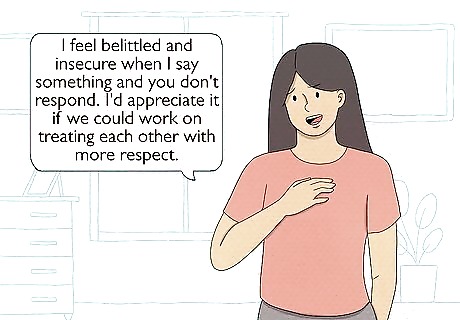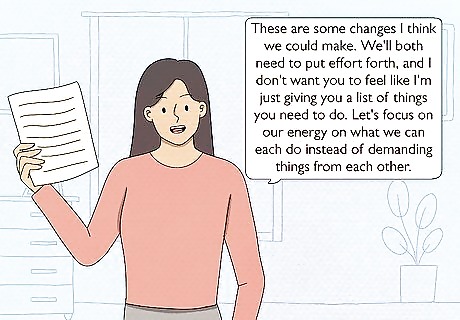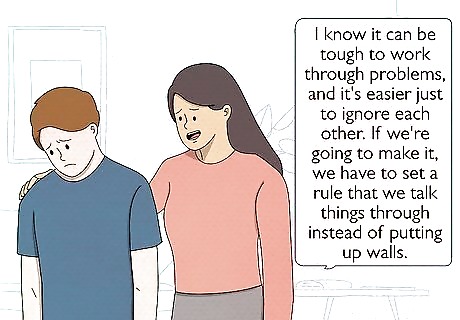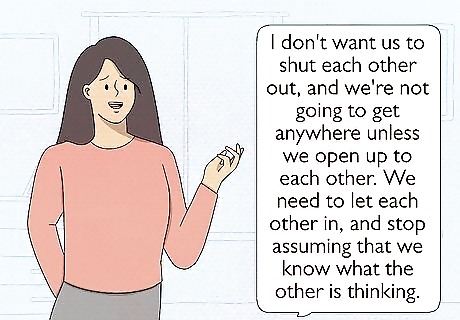
views
- To save your marriage, face any conflict directly and don’t wait for your partner to bring up problems, assuming they’ll blow over.
- Argue productively by rooting critique in your personal feelings and focusing on the present over the past.
- Cultivate intimacy by spending designated quality time together, and slowly work up to being physically intimate.
Identify the issues affecting your marriage.

Face any conflict head-on. It might be hard, but take an honest look at your relationship issues. Try to be specific instead of listing things like “we don't get along.” Ask yourself (and discuss with your spouse) focused questions, such as: Have you and your spouse grown apart? Do you have incompatible goals, desires, or visions of the future? Are your physical and emotional needs being met? What about your partner's needs? Do you and your spouse listen to each other? Is your communication limited to short conversations about necessities? Are you dealing with a stressful life event, such as problems at work, financial problems, illness, or the death of a loved one?
Acknowledge any underlying problems.

Large conflict is often caused by deep-seated issues. If your conflict is centered on a major violation, such as infidelity, try to identify and address any issues that may have contributed to that violation. If you were unfaithful, not only does repairing your marriage mean rebuilding trust; it means confronting possible factors that led to infidelity. For instance, maybe you felt ignored by your spouse. Keep in mind placing blame isn't productive. Instead of saying, “I cheated because you were emotionally unavailable,” say, “What I did was wrong, and I am so sorry. I'd like to work on regaining your trust.” Reader Poll: We asked 266 wikiHow readers who’ve cheated, and 60% of them agreed the biggest challenge in rebuilding trust is dealing with the emotional fallout and broken trust. [Take Poll]
Take initiative to solve problems.

Don’t wait for your partner to bring up concerns. If you feel that something needs to be addressed, talk to your partner about it. Waiting for your spouse to bring up problems, or hoping the problem will just go away if you don’t talk about it, will likely make it worse. If something has happened that hasn’t been addressed, try gently bringing it up: “I think things have been a little tense between us lately after our fight a few weeks ago, and I’m thinking maybe we could sit and talk about it. How about tonight over dinner?” If you sense something is amiss in your partner, ask them about it instead of assuming it’ll blow over or that they’ll bring it up: “You’ve seemed a little withdrawn lately. Is anything going on?”
Look for potential solutions to your difficulties.

Figure out what you can both do to fix things. What are specific changes both of you can make to improve your situation? Keep in mind both partners need to put an effort into resolving a relationship's difficulties. Try drawing a line down the middle of a sheet of paper. On one side, list things you could work on and, on the other, list things your spouse could do. You and your spouse could each make lists, then compare them with each other. For instance, you might write that you need to focus less on work or stop ordering your partner around. Maybe you'd like your partner to contribute more to maintaining your home and raising your kids.
Provide constructive feedback.

Root your complaints in your own feelings and voice criticism respectfully. All spouses get annoyed with each other and complain about pet peeves, but personal attacks will likely only widen the gap between you both. Instead, take responsibility for your feelings and respectfully explain what changes you’d like to see in your partner. Licensed Professional Counselor Tara Vossenkemper advises using "I" language over "you" language: "If I say to my partner something like, 'Why don't you ever do the dishes?'...that's much different than me saying, 'I'm feeling kind of resentful about this. The weight of this burden does not feel equally distributed. Can you help me fix this?'" Vossenkemper also advises avoiding what she calls "coded 'you' statements," like, "I feel like you don't listen." "A you statement is going to [create] defensiveness."
Acknowledge your individual shortcomings.

Avoid putting the onus to fix things entirely on your partner. Instead, focus on how you can contribute to a solution as well. Likewise, your spouse can focus on what they can do. Try saying, “I've been thinking about how we can make things better between us. I know it's not all on your shoulders: I think there are things we could both do.”
Control your temper.

Stop, breathe, and relax instead of yelling. No matter how frustrated you are with your spouse, do your very best to control your temper. In order to save your marriage, you and your spouse both need to keep your emotions in check. Whenever you're about to blow your top, count to 10 before you say anything. As tough as it is, resist the urge to fight, and think about your spouse's message. If your spouse is shouting, say, “I understand that you're upset, and I feel like yelling, too. But screaming at each other isn't going to get us anywhere. Let's cool down and show each other respect.”
Set a “no stonewalling” rule.

Stonewalling is when a partner shuts down or gives the silent treatment. You and your spouse won’t be able to resolve conflicts without practicing open communication. If one or both of you shut down, this can prevent you from communicating effectively. Try saying, “I know it can be tough to work through problems, and it's easier just to ignore each other. If we're going to make it, we have to set a rule that we talk things through instead of putting up walls.” It's okay to take time to cool down instead of discussing things in the heat of an argument. However, don't just ignore each other. Instead, say, “I think we should cool down for a bit, then talk this through when we're both calm.”
Give your spouse the benefit of the doubt.

Avoid making assumptions about your spouse's intentions. If they're short with you or ignore you, try to understand that they might not be trying to attack you. Do your best to show them empathy instead of responding with anger. For instance, if your partner is short with you, maybe they had a hard day at work. If they aren't talking to you, maybe they're sad, not angry. Try saying, “I love you, and I don't want us to shut each other out. We need to let each other in, and stop assuming that we know what the other is thinking.”
Try to talk regularly.

Set aside a time of the day for you and your spouse to have a good talk. Try to keep distractions, such as TV, phones, kids, or work, to a minimum. Rather than discussing chores and necessities, talk about your opinions, feelings, curiosities, fears, and goals. Vossenkemper notes that a lot of couples "don't make even a little bit of time for each other, just to say, 'This is what my day was like, these are my frustrations.' So share your internal world." It might take some time for deeper conversations to come naturally, so have patience. As you go about your day, note news stories, funny things you see, and other potential conversation starters. Additionally, let your spouse vent about their day to you. You don't necessarily need to give them advice or analysis. Providing each other a shoulder to lean on can help you rebuild your bond.
Focus on the present instead of the past.

Dredging up the past is unlikely to help you argue productively. It can be tempting to bring up something that happened 10 years ago when arguing with your spouse. But resolving conflicts isn't about winning: instead, aim to make your point calmly and rationally, and work with your spouse to find a compromise. “The most common relationship problems are not things,” Vossenkemper says. “They are methods of communication. And so people will argue about the most asinine things, but they're not arguing about that thing. They are kind of arguing about the way that they're talking about that thing.” If you constantly dredge up old dirt on your spouse, they'll feel attacked instead of involved in a discussion. As difficult as it is, try to forgive them for hurting you in the past. Focus on your marriage's present and future.
Focus on the positive.

Remember why you fell in love with your spouse in the first place. Think about first meeting your spouse, your first date, your wedding. Remind yourself that you and your partner have shared many wonderful moments, and there's a reason you've invested so much in each other. It's tough to rebuild a connection after years of monotony, stress, arguments, and everything else that comes with a marriage. Reminding yourself of your relationship's high points can help you focus on what you love about your spouse.
Perform daily acts of kindness for your spouse.

The little things in life make a bigger impact than grand gestures. Pay each other compliments, write each other notes or emails, and do other small, random acts that show you care. For example, you could slip a note into their bag before they leave for work that says, “Have a fantastic day! I love you.” You could let them know how nice they look, or do a chore they haven't gotten a chance to do.
Go on fun, exciting dates together.

Try to schedule a date night every week, or as often as you can. To alleviate boredom, do something new and exciting each time. You could try out a new restaurant or cuisine, go to a concert, go hiking, or explore a new part of your city. You could also go on day trips or weekend getaways. If you have kids, ask your parents, in-laws, or a babysitter to watch them so you can spend quality time with your spouse. Vossenkemper points out that you don't need to make big plans to have a nice time. Just take time for each other when and however you can: "It might also just be like drinking wine after the kids go to bed."
Be open about your wants and needs.

Cultivate intimacy by sharing what you need from your spouse. Let them know that they can trust you too, and that they can share anything without fear of judgment. Vossenkemper advises emphasizing what you need and want, versus what you don't: "'I need you to walk towards me and hold me.' 'I need a hug from you.' 'I need to hear that you care that I'm upset.' ...[Say] something that you want to see, rather than something that you don't want to see." Say, “I'd like us to be honest about what we need from each other. I want to fulfill your emotional and physical needs, and we both need to let each other know how to be the best partner.” It's scary to make yourself vulnerable and say, “I need you to tell me that you love me and find me attractive,” or “I want to try something new in the bedroom.” But having the courage to make yourselves vulnerable might be exactly what you both need to deepen your bond.
Try to rebuild your sex life little by little.

If you’ve grown physically distant, it’ll take time to rebuild that connection. Don’t be afraid to take it slow. Begin holding hands, hugging, and cuddling more often. As you grow more comfortable being physically intimate, work on touching each other, kissing, and, eventually, having sex more often. Check in with your spouse to make sure they're comfortable. You might say, “Do you mind if I hold your hand?” while watching a movie, or ask if they want a back rub after a long day.
Get help from a marriage counselor.

Counseling can help you navigate your problems in a safe environment. A counselor can offer an objective perspective and help you develop the skills needed to mend the gap in your relationship. It's particularly wise to seek counseling if you're dealing with issues like infidelity, addiction, or contempt. Try not to be nervous or self-conscious about seeing a counselor or therapist. Many couples get help from a professional.


















Comments
0 comment